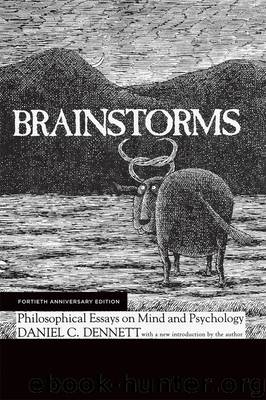Brainstorms by Dennett Daniel C.;

Author:Dennett, Daniel C.;
Language: eng
Format: epub
Tags: cognitive science; philosophy; free will; determinism; theory; consciousness; personhood
Publisher: MIT Press
Published: 2017-11-29T00:00:00+00:00
IV
With those qualifications and excuses behind me, I turn to the decisive question. Suppose an entity were all wired up in some fashion so as to realize the flow chart in Figure 9.1. What would it be like (if anything) to be such an entity? At first glance the answer seems to be: not like anything. The whole system has been designed to operate in the dark, as it were, with the various components accomplishing their tasks unperceived and unperceiving. In particular, we have not supposed any inner introspecting eye to be watching the perceptual analysis processes, the control decisions, the efforts of PR to execute its orders. And yet to us on the outside, watching such an entity, engaging it in conversation, listening to its efforts to describe the effects on it of various perceptual environments, there will be at least the illusion that it is like something to be the entity. In fact it will tell us (or at least seem to be telling us) just what it is like. But inside it is all darkness, a hoax. Or so it seems. Inside your skull it is also all darkness, and whatever processes occur in your gray matter occur unperceived and unperceiving. Can it be said that just as there is some other point of view that you have, there is some other point of view that it has?
It is hard to know how to answer that question. But the following may help. Suppose I put forward the bold hypothesis that you are a realization of this flow chart, and that it is in virtue of this fact that it seems—to us and to you—that there is something it is like to be you. Can you give good grounds for denying the hypothesis, and if so, what are they? What personal access do you have, and to what? Here I must abruptly shift the perspective of this paper and wax phenomenological for a while. I want to draw your attention to a class of phenomena. If you have ever had a sudden presentiment that someone was looking over your shoulder, or a premonition that something dire was about to happen, you are acquainted with the phenomena. These events are propositional episodes, thinkings that p; there is normally some inclination to express them (although the inclination is easily suppressed or canceled), and we may not even express them to ourselves in “inner speech.” When they occur in us, we have not the faintest idea what their etiology is (unless we have some theory about the causes of premonitions; my point is that “to introspection” they arrive from we know not where). There are other more familiar examples of coming to want to say something without knowing how or why. Witticisms “occur to us,” but we do not know how we produce them (the example is Ryle’s). Lashley long ago pointed out that if asked to think a thought in dactylic hexameter we (many of us) can oblige, but we
Download
This site does not store any files on its server. We only index and link to content provided by other sites. Please contact the content providers to delete copyright contents if any and email us, we'll remove relevant links or contents immediately.
The Art of Thinking Clearly by Rolf Dobelli(10487)
Mindhunter: Inside the FBI's Elite Serial Crime Unit by John E. Douglas & Mark Olshaker(9339)
Change Your Questions, Change Your Life by Marilee Adams(7780)
Nudge - Improving Decisions about Health, Wealth, and Happiness by Thaler Sunstein(7706)
Mastermind: How to Think Like Sherlock Holmes by Maria Konnikova(7342)
The Power of Now: A Guide to Spiritual Enlightenment by Eckhart Tolle(5781)
Men In Love by Nancy Friday(5239)
Altered Sensations by David Pantalony(5103)
Factfulness: Ten Reasons We're Wrong About the World – and Why Things Are Better Than You Think by Hans Rosling(4742)
The Confidence Code by Katty Kay(4258)
Thinking in Bets by Annie Duke(4226)
Man and His Symbols by Carl Gustav Jung(4134)
The Worm at the Core by Sheldon Solomon(3486)
Why Buddhism is True by Robert Wright(3451)
Liar's Poker by Michael Lewis(3446)
Three Women by Lisa Taddeo(3431)
The Inner Life of Animals by Peter Wohlleben(3318)
Descartes' Error by Antonio Damasio(3277)
How Music Works by David Byrne(3268)
